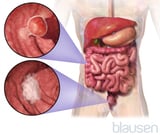What Happens When Hemoglobin Continues to Drops to 7
Anemia due to excessive bleeding results when loss of red blood cells exceeds production of new red blood cells.
-
When blood loss is rapid, blood pressure falls, and people may be dizzy.
-
When blood loss occurs gradually, people may be tired, short of breath, and pale.
-
Stool, urine, and imaging tests may be needed to determine the source of bleeding.
-
The cause of bleeding is corrected, and transfusions and iron supplements are given if needed.
-
Excessive bleeding
When blood is lost, the body quickly pulls water from tissues outside the bloodstream in an attempt to keep the blood vessels filled. As a result, the blood is diluted, and the hematocrit (the percentage of red blood cells in the total amount of blood in the body, or blood volume) is reduced. Eventually, increased production of red blood cells by the bone marrow may correct the anemia. However, over time, bleeding reduces the amount of iron in the body, so that the bone marrow is not able to increase production of new red blood cells to replace those lost.
The symptoms may be severe initially, especially if anemia develops rapidly as a result of the sudden loss of blood due to an injury, surgery, childbirth, or a ruptured blood vessel. Losing large amounts of blood suddenly can create two problems:
-
The body's oxygen supply is drastically reduced because the number of oxygen-carrying red blood cells has decreased so quickly.
Far more common than a sudden loss of blood is long-term (chronic) bleeding, which may occur from various parts of the body. Although large amounts of bleeding, such as that from nosebleeds and hemorrhoids, are obvious, small amounts of bleeding may not be noticed. For example, a small amount of blood may not be visible in the stool. This type of blood loss is described as occult (hidden). If a small amount of bleeding continues for a long time, a significant amount of blood may be lost. Such gradual bleeding may occur with common disorders, such as ulcers Peptic Ulcer Disease A peptic ulcer is a round or oval sore where the lining of the stomach or duodenum has been eaten away by stomach acid and digestive juices. Peptic ulcers can result from Helicobacter pylori... read more  in the stomach or small intestine, polyps Polyps of the Colon and Rectum A polyp is a projecting growth of tissue from the wall of a hollow space, such as the intestines. Some polyps are caused by hereditary conditions. Bleeding from the rectum is the most common... read more
in the stomach or small intestine, polyps Polyps of the Colon and Rectum A polyp is a projecting growth of tissue from the wall of a hollow space, such as the intestines. Some polyps are caused by hereditary conditions. Bleeding from the rectum is the most common... read more  in the large intestine, or cancers in the large intestine Colorectal Cancer Family history and some dietary factors (low fiber, high fat) increase a person's risk of colorectal cancer. Typical symptoms include bleeding during a bowel movement, fatigue, and weakness... read more
in the large intestine, or cancers in the large intestine Colorectal Cancer Family history and some dietary factors (low fiber, high fat) increase a person's risk of colorectal cancer. Typical symptoms include bleeding during a bowel movement, fatigue, and weakness... read more  . Other sources of chronic bleeding include kidney tumors Kidney Cancer Most solid kidney tumors are cancerous, but purely fluid-filled tumors (cysts) generally are not. Almost all kidney cancer is renal cell carcinoma. Another kind of kidney cancer, Wilms tumor... read more or bladder tumors Bladder Cancer Most bladder cancers are of a type called transitional cell because they affect the same kinds of cells (transitional cells) that are usually the cancerous cells responsible for cancers of the... read more , which may cause blood to be lost in the urine, and heavy menstrual bleeding Abnormal Uterine Bleeding (AUB) Abnormal uterine bleeding is bleeding from the vagina that occurs frequently or irregularly or lasts longer or is heavier than normal menstrual periods. The most common type of abnormal bleeding... read more
. Other sources of chronic bleeding include kidney tumors Kidney Cancer Most solid kidney tumors are cancerous, but purely fluid-filled tumors (cysts) generally are not. Almost all kidney cancer is renal cell carcinoma. Another kind of kidney cancer, Wilms tumor... read more or bladder tumors Bladder Cancer Most bladder cancers are of a type called transitional cell because they affect the same kinds of cells (transitional cells) that are usually the cancerous cells responsible for cancers of the... read more , which may cause blood to be lost in the urine, and heavy menstrual bleeding Abnormal Uterine Bleeding (AUB) Abnormal uterine bleeding is bleeding from the vagina that occurs frequently or irregularly or lasts longer or is heavier than normal menstrual periods. The most common type of abnormal bleeding... read more  .
.
Symptoms are similar to those of other types of anemia and vary from mild to severe, depending on
-
How much blood is lost
-
How rapidly blood is lost
When the blood loss is rapid—over several hours or less—loss of just one third of the blood volume can be fatal. Dizziness upon sitting or standing after a period of lying down (orthostatic hypotension) is common when blood loss is rapid. When the blood loss is slower—over several weeks or longer—loss of up to two thirds of the blood volume may cause only fatigue and weakness or no symptoms at all, if the person drinks enough fluids.
-
Blood tests
-
Sometimes imaging or endoscopy
Doctors do blood tests to detect anemia when people describe symptoms of anemia, have noticed bleeding, or both. Stool and urine are tested for blood in an effort to identify the source of bleeding.
Imaging tests or endoscopy may be needed to identify the source of bleeding.
-
Stopping bleeding
-
Usually iron supplements
With slow or small blood loss, the body may produce enough red blood cells to correct the anemia without the need for blood transfusions once the bleeding is stopped.
Because iron, which is required to produce red blood cells, is lost as a result of bleeding, most people who have anemia due to bleeding need to take iron supplements, usually tablets, for several months. Sometimes people are given iron intravenously.
CLICK HERE FOR THE PROFESSIONAL VERSION

Copyright © 2022 Merck & Co., Inc., Rahway, NJ, USA and its affiliates. All rights reserved.
Source: https://www.merckmanuals.com/home/blood-disorders/anemia/anemia-due-to-excessive-bleeding
0 Response to "What Happens When Hemoglobin Continues to Drops to 7"
Postar um comentário